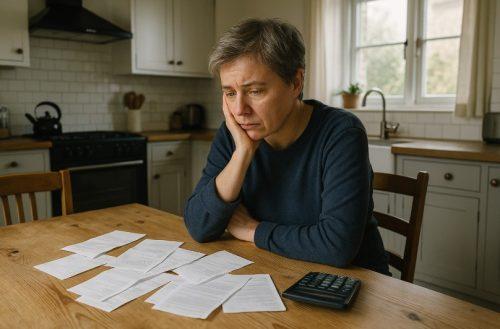If you have an outstanding debt in the UK, you may wonder whether it can follow you indefinitely. The answer lies in the rules set out in the Limitation Act 1980, which establishes how long a creditor has to take legal action.
For most debts, this time limit is six years from when you last made a payment or acknowledged the debt in writing. However, not all debts follow the same rule, some can be pursued for much longer, and others have no limit at all. Knowing where you stand can help you avoid costly mistakes, such as making a small payment that resets the clock.
In this article, you’ll learn what it means to be liable for a debt, the legal time limits for different debts, when the countdown starts, and how to handle debts that are either still enforceable or statute barred.
What Does It Mean to Be Liable for a Debt in the UK?

Before you can determine how long a debt can be chased, you need to understand what liability means. Being liable means you have a legal duty to repay the debt because of an agreement, service, or obligation.
You are typically liable if you have:
- Signed a credit agreement such as a loan or credit card contract
- Entered a tenancy agreement for a rented property
- Agreed to pay for utilities such as council tax or water charges
You may not be liable if:
- Six years have passed without payment or written acknowledgement
- You were pressured into signing the agreement or it was unclear
- The creditor failed to confirm you could afford repayments
Certain cases, such as being an additional cardholder or being under 18, come with specific rules. If you are not liable, you can challenge the creditor. Understanding your liability status is essential before deciding your next step with any debt.
How Long Can You Legally Be Chased for a Debt UK?
The Limitation Act 1980 states that, for most unsecured debts, creditors have six years to start legal proceedings from the date of your last payment or written acknowledgement. This period is known as the limitation period.
What Are the Key Points to Remember?
- The limitation period applies to legal action, not creditor contact
- A single payment or written admission restarts the six-year clock
- Once the period ends, the debt is statute barred and cannot be enforced in court
However, the debt does not vanish. Creditors may still request payment informally or use debt collection agencies to pursue you. This means that while legal enforcement stops after the limitation period, communication from creditors may continue.
Being aware of this timeframe helps you avoid accidentally resetting it. Always confirm the date of your last payment or written acknowledgement before making any contact with a creditor about an old debt.
Which Debts Have Different Time Limits in the UK?

While many debts have a six-year limit, others can be pursued for longer or even indefinitely. This is why it’s important to know the specific rules for each debt type.
Examples include:
- Mortgage shortfalls: Six years for interest, twelve years for the main balance
- HMRC debts: No time limit for income tax, VAT, or capital gains tax
- County Court Judgments (CCJs): No time limit, though court permission is needed after six years
- Council tax arrears: Six years to apply for a liability order, then no limit on enforcement
- Benefit overpayments: Usually six years but may be recovered through benefit deductions
Understanding these exceptions ensures you don’t assume a debt has expired when it hasn’t. Government debts, in particular, are often pursued for far longer than standard consumer debts. By knowing the applicable time limits, you can make informed choices about repayment or challenging a claim.
When Does the Limitation Period Start for a Debt?
The limitation period begins from the date the creditor could first have taken court action. This is called the cause of action and is often linked to your last payment or written acknowledgement.
When May the Limitation Period Start or Reset?
- You make a payment, even a small one
- You write to the creditor admitting the debt
- For joint debts, when one party acknowledges or pays
Mortgage debts may start counting after a series of missed payments rather than the first one. Knowing when the period starts is crucial. You can check your bank statements, credit report, or speak to the creditor by phone to verify the date. By confirming this information, you avoid accidental resets that could extend your liability for years.
What Does It Mean if a Debt Is Statute Barred?

When a debt becomes statute barred, it means the creditor has run out of time to enforce it in court. For most debts, this happens after six years without payment or written acknowledgement.
Important considerations:
- The debt still exists, but you can legally refuse payment
- Creditors may continue to request payment informally
- Your credit file may already be clear if defaults are over six years old
Once statute barred, you are protected from legal action. However, you must be careful not to restart the clock by making a payment or admitting the debt in writing. Confirming the debt’s status before taking action is the safest approach.
Can a Creditor Still Contact You About a Statute Barred Debt?
Even if a debt is statute barred, a creditor can still contact you to request payment. What they cannot do is take you to court over it.
If you are contacted:
- State politely that you believe the debt is statute barred
- Avoid making payments or written acknowledgements
- Complain to the creditor or the Financial Ombudsman if contact becomes harassment
This approach allows you to protect your rights without escalating the situation. While you cannot stop all communication, you can prevent any legal consequences by understanding your position.
What Should You Avoid If a Debt Might Be Statute Barred?
If you believe your debt is close to being statute barred, you must act cautiously. Mistakes can give the creditor another six years to pursue you in court.
Avoid:
- Writing to the creditor in any form
- Making any payment, even a small one
- Admitting to owing the debt
By steering clear of these actions, you protect yourself from resetting the limitation period. Confirming the timeline before engaging with the creditor is the safest way to avoid prolonging your liability.
Can You Be Sent to Prison for Not Paying a Debt in the UK?

For most debts, you cannot be sent to prison. Debt is not a criminal offence.
The exceptions are rare and include:
- Failing to pay certain court fines
- Deliberately avoiding child maintenance payments
- Committing fraud related to the debt
Even in these cases, prison is a last resort. Understanding this can ease some of the stress that comes with being chased for payment. Most debt issues are resolved through financial arrangements or legal processes, not imprisonment.
How Can You Check If Your Debt Is Still Enforceable?
Checking if your debt is enforceable helps you decide your next steps.
You can:
- Review your credit report for payment history
- Check bank statements for your last payment date
- Call (but don’t write to) the creditor for confirmation
- Seek help from debt charities
Knowing the debt’s enforceability allows you to plan confidently. If it’s statute barred, you can request the creditor to stop contacting you. If it’s still enforceable, you can explore repayment or negotiation options before legal action begins.
What Should You Do If Your Debt Is Still Within the Time Limit?

If your debt is still enforceable, taking early action can prevent court proceedings.
You might:
- Negotiate a repayment plan that suits your budget
- Apply for the Breathing Space scheme to pause creditor action
- Seek advice from debt management organisations
Acting promptly can reduce stress and may lead to better repayment terms. Ignoring an enforceable debt increases the risk of court orders and further costs.
UK Debt Types and Time Limits for Chasing
| Debt Type | Limitation Period | Notes |
| Most unsecured debts | 6 years | From last payment or written acknowledgement |
| Mortgage interest | 6 years | Starts after default |
| Mortgage capital | 12 years | Starts after default |
| HMRC debts | No limit | Can be chased indefinitely |
| CCJs | No limit | Court permission needed after 6 years |
| Council tax arrears | 6 years to apply for liability order | Unlimited time to enforce |
Conclusion
Knowing how long you can legally be chased for a debt in the UK can help you protect your financial position and avoid unnecessary payments. The Limitation Act 1980 provides a general six-year limit for most debts, but exceptions exist for mortgage shortfalls, HMRC debts, and CCJs.
Understanding when the limitation period starts and what can reset it is vital, as even a small payment can add years to your liability. If your debt is statute barred, you are shielded from legal enforcement, though creditors may still contact you.
If it’s still enforceable, taking early, informed action can help you manage repayment and reduce stress. By staying aware of your rights and the time limits involved, you can make decisions that safeguard your future and avoid costly mistakes.
FAQs
How do I know if my debt is statute barred in the UK?
You can check if a debt is statute barred by confirming the date you last made a payment or acknowledged it in writing. If six years have passed for most debts without either happening, and no court action has been taken, it may be statute barred. You can verify this through bank statements, credit reports, or by phoning the creditor.
Can statute barred debt still affect my credit rating?
No, statute barred debt will not appear on your credit file if more than six years have passed since the default date. However, missed payments leading up to that point may remain on your record for the same six-year period.
Do mortgage debts have the same time limit as other debts?
No, mortgage debts are different. Lenders have six years to claim interest and twelve years to claim the main balance (capital). The countdown usually begins after the property is repossessed and payments stop.
Can HMRC chase old debts forever?
Yes, HMRC debts, such as unpaid income tax, VAT, or capital gains tax, have no time limit. They can pursue you indefinitely, regardless of how old the debt is.
Does a County Court Judgment (CCJ) expire after six years?
No, a CCJ does not expire. Creditors can enforce it indefinitely, but they need court permission if they act more than six years after the judgment was issued.
Should I contact a creditor if I think my debt is statute barred?
It’s best not to contact them in writing, as this can restart the limitation period. If you must check, do so by phone and avoid making any admissions of liability.
Can creditors use bailiffs for statute barred debts?
No, once a debt is statute barred, it cannot be enforced in court, which means bailiffs cannot be instructed to collect it. Creditors may still ask for payment informally, but you are not legally obliged to pay.
Recent Posts








